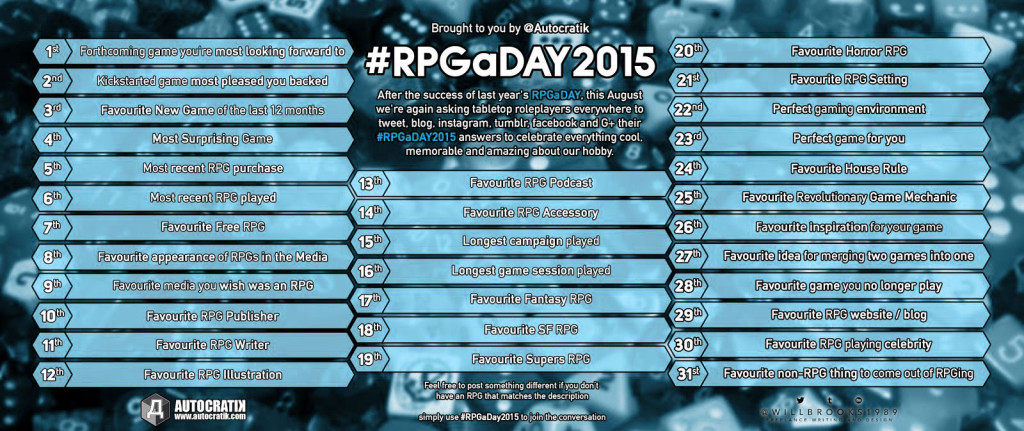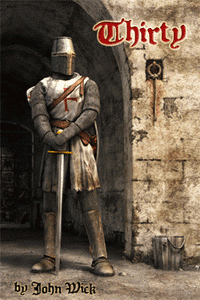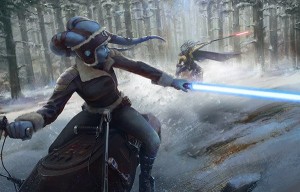
Regarding a Favorite RPG Writer, I don’t really pay much attention to that, or at least as much as others do. See, I do graphic design and book layout and I’ve always equated it to a letterer’s job in comic books: if you do it right, nobody notices. And because I work behind the scenes (although usually coming in at the end of a project), I see a lot going on in creating one of those big RPG books. Sections are written by different people and have to be rewritten to have a book’s “voice”: chapters three and seven have to sound like they’re written by the same people, even if the two writers have never met. There’s the project manager and the editors and proofreaders keeping all this straight. They’re also the invisible hands on a project. They do a good job and you don’t notice.
This process subtly changes the output of the writing. Bob’s contributions on the Big Book of Laser Rockets and Mega Swords RPG and his work on Small Press Fantasy might have different feelings, different impressions. What can I really say about Bob, besides from what I know from him on social media and the moments I’ve run into him at Big Con? Well, I can look at some of the rules that he uses in his work: differences or similarities. I can’t even tell if Bob likes the Oxford comma, because the editors decided to use it in the Eclipse Comics Superhero RPG but not in Harryhausen Mythological Roleplaying. It can be difficult to get a sense of a writer.
That is, unless the writer independently publishes her own work, generally doesn’t seem to collaborate on her games, and keeps the same editor(s) across her career — the same guy that gets her voice and helps to make it shine through her games.
So I guess it’s probably John Wick.

 Not only does he have a writing style that I enjoy, he was also the guest of honor at the first Gamemasters’ Conference that we held in Tucson. He got up, delivered a great talk about some things he learned running games, and I helped to fuck up a magic trick he was performing. ((I seem to always screw something up when John’s around. It’s seriously not on purpose.)) I’m always interested when John has a new thing out, although nearly everything I have that John wrote seems to be short form: I have both Play Dirty essay collections, several of his little games (including the Big Book of Little Games), and even the What’s That Smell? adventure for D&D 3.5. But I don’t have any of his bigger games, like 7th Sea or Legend of the Five Rings, having been aware of them far too late to delve into the massive backstory. ((If I had come across L5R back when the game started, I know I would have thrown way too much money at Alderac.))
Not only does he have a writing style that I enjoy, he was also the guest of honor at the first Gamemasters’ Conference that we held in Tucson. He got up, delivered a great talk about some things he learned running games, and I helped to fuck up a magic trick he was performing. ((I seem to always screw something up when John’s around. It’s seriously not on purpose.)) I’m always interested when John has a new thing out, although nearly everything I have that John wrote seems to be short form: I have both Play Dirty essay collections, several of his little games (including the Big Book of Little Games), and even the What’s That Smell? adventure for D&D 3.5. But I don’t have any of his bigger games, like 7th Sea or Legend of the Five Rings, having been aware of them far too late to delve into the massive backstory. ((If I had come across L5R back when the game started, I know I would have thrown way too much money at Alderac.))
Coincidence: See last post. It’s John Wick day.
 I’ve never really picked up any of John’s big games: 7th Sea, Legend of the Five Rings, or even Houses of the Blooded. Everything I have of Wick’s has been his little games. Thirty is the closest thing to one of his big games, but it’s not. It says so in the name, which truthfully is Thirty: A Little Game about a Big Secret.
I’ve never really picked up any of John’s big games: 7th Sea, Legend of the Five Rings, or even Houses of the Blooded. Everything I have of Wick’s has been his little games. Thirty is the closest thing to one of his big games, but it’s not. It says so in the name, which truthfully is Thirty: A Little Game about a Big Secret.
 Maybe it’s not that. Maybe it’s which publisher publishes your favorite stuff? Or which one made your favorite game? Or which one has a constant output of new stuff, continually making your game better and better?
Maybe it’s not that. Maybe it’s which publisher publishes your favorite stuff? Or which one made your favorite game? Or which one has a constant output of new stuff, continually making your game better and better?